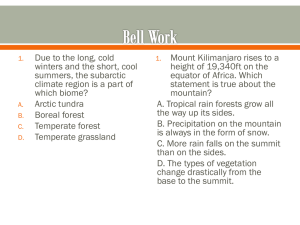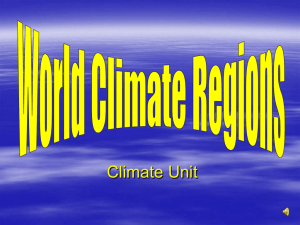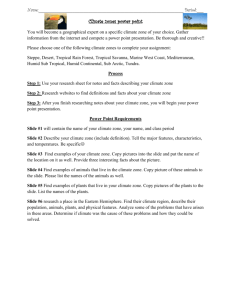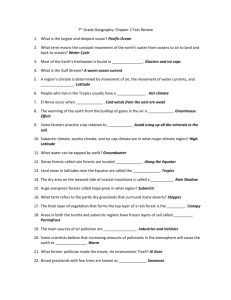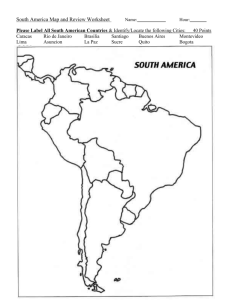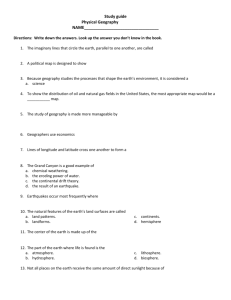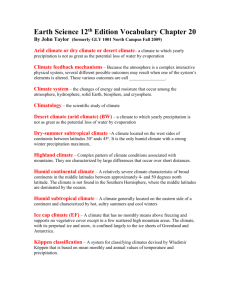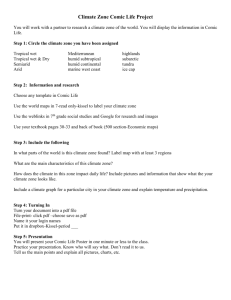World Climates - Ms. Zolpis' Classes
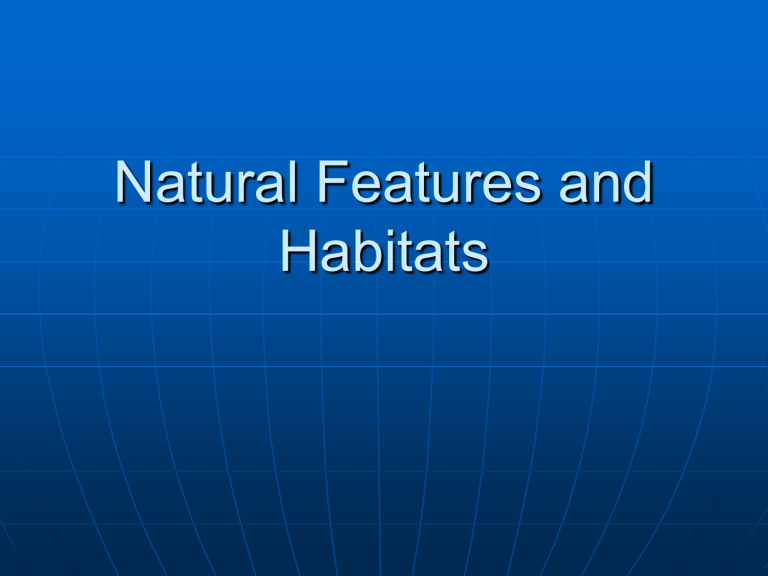
Natural Features and
Habitats
Natural Features
Using a destination such as Australia as a guide, what natural features might attract tourists to the area?
What is a natural habitat?
Come up with a definition for
“Natural Habitat”
Brainstorming Mind Map
Global Natural Habitats - popplet generate a list of natural habitats such as vegetation-based, landformbased and wildlife-based
“Mountains in Motion” Timelapse
http://mountainsinmotion.ca/screeni ng/
Climates of the World
World Climate Regions
1. Tropical Humid
2. Tropical Wet & Dry
3. Arid (Desert)
4. Semiarid
5. Mediterranean
6. Marine West Coast
7. Humid Subtropical
8. Humid Continental
9. Subarctic
10. Tundra
11. Ice Cap
12. Highland (Alpine)
Tropical Humid
•
•
•
•
•
•
•
Little variation in temperature over the year.
It is always hot with a daily average temperature of
80 degrees Fahrenheit.
Rains on a daily basis and yearly average rainfall is usually more than 80 inches.
Found in Central and South America, as well as Africa
,South Asia (India), Southeast Asia and Indonesia .
Associated with Rainforests and Jungles.
Found along the Equator or areas close to the
Equator.
http://www.blueplanetbiomes.org/rainforest.htm
Tropical
Wet & Dry
•
•
•
•
•
This sub region has a rainy season in the summer and a dry season in winter.
Temperatures are cooler in the dry season.
Yearly rainfall is less than a Tropical Humid Climate.
Tropical Wet & Dry climates are found next to tropical humid climates in Africa, South & Central America, and parts of Asia.
The Savannah of Africa is a prime example.
http://www.blueplanetbiomes.org/savanna.htm
ARID
(DESERT)
•
•
•
Deserts are categorized by the amount annual rainfall received.
Deserts receive less than 10 inches of rainfall per year.
Hot deserts (Sahara) have low humidity and high temperatures during the day. At night the temperature falls because the dry air cannot hold heat well.
http://www.blueplanetbiomes.org/desert.htm
Semiarid
•
•
•
•
This sub-region does not receive much precipitation at all – Usually about 16 inches per year.
Summers are hot and winters are mild to cold.
This climate is located in the interior of continents, or in a zone around deserts.
Much of the American west falls into this climate type.
Mediterranean
• Primarily found surrounding the
Mediterranean Sea.
• Summers are dry and hot while winters are cool and rainy.
• Supports a dense human population and rich agricultural activity.
• Many of the first great human civilizations thrived in this climate. http://www.blueplanetbiomes.org/med_chaparral.htm
Marine West Coast
• Located close to the oceans and is frequently cloudy, foggy, and damp.
• Warm ocean waters off the coast moderates and keeps temperatures relatively constant throughout the year.
• Precipitation is evenly distributed throughout the year.
• Rains a lot throughout the year.
• Seattle, WA (Pacific Northwest)
• London, England
Humid Subtropical
•
•
•
•
•
Long periods of heat and humidity characterize this climate region.
These areas are found on the east coast of continents and are often subject to hurricanes in late summer and autumn.
Winters are mild to cool, depending on latitude.
Very suitable for raising crops, (rice).
Philadelphia, PA & South
Jersey
Humid
Continental
•
•
•
This climate region experiences a variety in temperature and precipitation.
Mostly found in mid-latitude (40’s to 50 degrees) interiors of northern hemisphere continents.
These regions also experience four distinct seasons.
•
•
NEPA is located in this climate region.
Deciduous Forests thrive in this climate.
http://www.blueplanetbiomes.org/deciduous_forest.htm
SUBARCTIC
• Evergreen forests called “TAIGA” cover the lands in this climate region.
• Huge temperature variations occur between summer and winter.
• Summers are short and cool while the winters are long & extremely cold.
• Temperatures at freezing or below last five to eight months of the year.
• Boreal Forest http://www.blueplanetbiomes.org/taiga.htm
TUNDRA
•
•
•
•
•
Tundra is the flat, treeless lands forming a ring around the Arctic Ocean.
Almost exclusively located in the northern hemisphere
Very little rainfall – less than 15 inches/year.
Permanently frozen subsoil called “Permafrost”
Summer only lasts a few weeks with temperatures around 40 degrees Fahrenheit. http://www.blueplanetbiomes.org/tundra.htm
Ice Cap
•
•
•
•
•
Snow, ice, and permanently freezing temperatures characterize this region.
So cold it rarely snows.
This region is sometimes referred to as a Polar
Desert because it receives less than 10 inches of precipitation per year.
Coldest temperature = -128.6
o
Antarctica)
F (Vostok,
Found only on the continent of Antarctica
HIGHLANDS
(Alpine)
Highland climates vary depending upon four factors:
1. Latitude
2. Elevation (Altitude)
3. Topography
4. Continental Location http://www.blueplanetbiomes.org/alpine.htm
Climate Region
Tropical Humid
Tropical Wet & Dry
Semiarid
Arid (Desert)
Mediterranean
Marine West Coast
Major Characteristics
Always hot (80o F average)
& rains daily
Rainy season in summer & dry season in winter
About 16” rain per year
Less than 10” rain per year.
Hot, dry summers & cool, rainy winters.
Northwest United States &
Western Europe.
Climate Type
Humid Subtropical
Humid Continental
Subarctic
Tundra
Ice Cap
Highlands (Alpine)
Major Characteristics
Found in SE United States
& subject to hurricanes.
Found in NEPA & experiences four seasons.
Evergreen forests dominate this climate.
Summers are so short and cool that permafrost exists.
Known as the Polar desert
Climate varies with four factors.
Cultural Geography
What is it??
Review: Cultural tourism is….
Concerned with the culture of the area, ex.
History, art, people, religion, architecture
Tourists want to experience the elements that have shaped the lives of those who live in that culture
How does the culture of a region affect its tourism?
Cambodia Tourism Song -
Potentials of Cultural Tourism
http://www.youtube.com/watch?v=GUD-
Qc9YtNM
25 Places You Have To See
Before You Die
http://www.youtube.com/watch?v=k4tkrJ5
63b0
Seven Wonders of the World
The Original Seven Wonders of the World
The Colossus of Rhodes
The Great Pyramid of Giza
The Hanging Gardens of Babylon
The Lighthouse of Alexandria
The Mausoleum at Halicarnassus
The Statue of Zeus at Olympia
The Temple of Artemis at Ephesus
Seven Wonders of the World
The Seven Wonders of the Modern World
Channel Tunnel
CN Tower
Empire State Building
Golden Gate Bridge
Itaipu Dam
Netherlands North Sea Protection Works
Panama Canal
Seven Wonders of the World
Natural Wonders of the World
In 1997, CNN announced a listing of the
Seven Natural Wonders of the World...
Grand Canyon
The Great Barrier Reef
The Harbor at Rio de Janeiro
Mt. Everest
Northern Lights
Paricutin Volcano
Victoria Falls
Seven Wonders of the World
The "New" Seven Wonders of the World
On July 7, 2007 (7-7-07) an organization announced a "new" set of the Seven Wonders of the World based on online voting from around the world...
Chichen Itza, Mexico - Mayan City
Christ Redeemer, Brazil - Large Statue
The Great Wall, China
Machu Picchu, Peru
Petra, Jordan - Ancient City
The Roman Colosseum, Italy
The Taj Mahal, India
Great Barrier Reef
http://www.youtube.com/watch?v=X3kPgb
PPqvQ
Rainforest: Beneath the
Canopy Part 1
http://www.youtube.com/watch?v=7HfeBP
3vaEI
